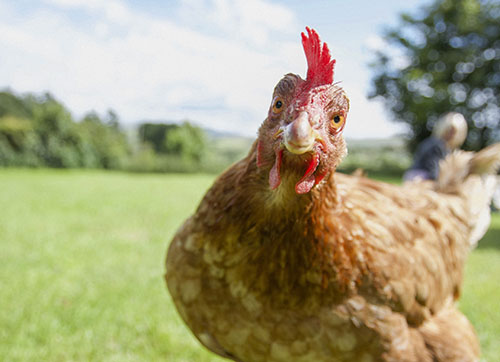Managing Poultry Health
Feb 13, 2023

Written by Dr. Kevin Cox, DVM, CEO Alliance Animal Care
After a long and dreary winter, spring is finally around the corner. And nothing says spring at the Co-op like baby chicks peeping and scratching their way into the stores’ showrooms! 4-H poultry projects will soon be underway, and interest in backyard chickens has dramatically increased over the last several years, as well as raising game fowl. It is a great time to start planning for these ventures and for the health needs of your flock.
The two primary health concerns of poultry and game fowl are respiratory diseases and intestinal parasitism. Unfortunately, many respiratory problems are viral in nature and are difficult to treat. While vaccination is a possibility for many of these diseases, most poultry vaccines are sold in bottles of extremely large doses, making it impractical for the backyard poultry producer to utilize. However, all hope is not lost! This gives the backyard poultry producer a reason to do an excellent job of biosecurity and animal husbandry. Keeping feeding and watering containers clean and disinfected are simple ways to prevent the spread of disease.
There are several products that can be used to help keep management tools clean and free of disease. It is also important to remember that though many of the respiratory-causing agents are viral, there are some that are bacterial as well, and the viral ones may have secondary bacterial infections. So, it is always wise to have an antibiotic available to treat birds. Most of the time, in poultry and game fowl, this is done via antibiotics in the drinking water. Finally, it is important to think about parasite control. Fortunately, there are dewormers that are available for use in drinking water as well. Don’t forget about external parasites, especially in the hotter summer months. Those types of products are generally applied to the bird or the bird’s environment.
All the different types of products mentioned above can be found at your local Co-op with the exception of antibiotics which can be sourced from your veterinarian. Ask the animal health specialist at your local Co-op if you have any questions about product names and types.
For more content like this, check out the latest issue of The Cooperator.
After a long and dreary winter, spring is finally around the corner. And nothing says spring at the Co-op like baby chicks peeping and scratching their way into the stores’ showrooms! 4-H poultry projects will soon be underway, and interest in backyard chickens has dramatically increased over the last several years, as well as raising game fowl. It is a great time to start planning for these ventures and for the health needs of your flock.
The two primary health concerns of poultry and game fowl are respiratory diseases and intestinal parasitism. Unfortunately, many respiratory problems are viral in nature and are difficult to treat. While vaccination is a possibility for many of these diseases, most poultry vaccines are sold in bottles of extremely large doses, making it impractical for the backyard poultry producer to utilize. However, all hope is not lost! This gives the backyard poultry producer a reason to do an excellent job of biosecurity and animal husbandry. Keeping feeding and watering containers clean and disinfected are simple ways to prevent the spread of disease.
There are several products that can be used to help keep management tools clean and free of disease. It is also important to remember that though many of the respiratory-causing agents are viral, there are some that are bacterial as well, and the viral ones may have secondary bacterial infections. So, it is always wise to have an antibiotic available to treat birds. Most of the time, in poultry and game fowl, this is done via antibiotics in the drinking water. Finally, it is important to think about parasite control. Fortunately, there are dewormers that are available for use in drinking water as well. Don’t forget about external parasites, especially in the hotter summer months. Those types of products are generally applied to the bird or the bird’s environment.
All the different types of products mentioned above can be found at your local Co-op with the exception of antibiotics which can be sourced from your veterinarian. Ask the animal health specialist at your local Co-op if you have any questions about product names and types.
For more content like this, check out the latest issue of The Cooperator.